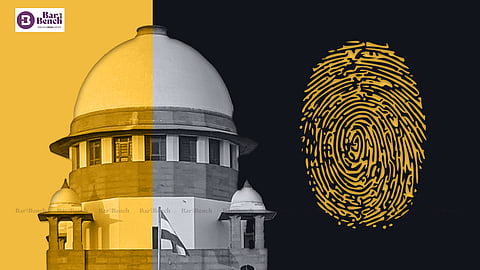
- Latest Legal News
- News
- Dealstreet
- Viewpoint
- Columns
- Interviews
- Law School
- Legal Jobs
- हिंदी
- ಕನ್ನಡ

The genuineness of a cancellation deed cannot be doubted only because the literate person who executed such deed affixed his thumb impression on the same instead of signing it (Lachhmi Narain Singh (D) v. Sarjug Singh).
A Bench of Justices Sanjay Kishan Kaul and Hrishikesh Roy ruled that the adverse inference cannot be drawn for affixing thumb impression instead of signing documents of property transaction.
“The key characteristic of thumb impression is that every person has a unique thumb impression. Forgery of thumb impressions is nearly impossible. Therefore, adverse conclusion should not be drawn for affixing thumb impression instead of signing documents of property transaction,” the Court ruled.
The judgment came on an appeal filed Patna High Court whereby the appeal filed by the probate applicant was allowed in his favour by concluding that the will favouring one Sarjug Singh was not cancelled.
Thus, High Court had reversed the trial court’s decision which held that the applicant is disentitled to get the Will probated as the same was revoked.
By way of background, one Rajendra Singh had executed a will on September 14, 1960 in favour of the applicant Sarjug Singh. The executant died issueless in 1963 leaving behind his sister Duler Kuer, wife of late Thakur Prasad Singh and nephew Yugal Kishore Singh and also the probate applicant Sarjug Singh.
The case of the applicant Sarjug Singh was that the testator’s wife died long ago and therefore, Rajendra Singh who was issueless bequeathed his property in favour of Sarjug Singh.
In the probate proceeding initiated by Sarjug Singh, objection was filed by Shyam Sunder Kuer alias Raj Bansi Kuer (claiming to be the second wife and widow of the testator). Khedaran Kuer also opposed the applicant and she claimed to be the widow of Jamadar Singh who was the son of late Jag Jitan Singh (brother of the testator Rajendra Singh).
According to the objectors, the will favoring Sarjug Singh was revoked and cancelled by a registered deed dated February 2, 1963.
Sarjug Singh, however, claimed that the testator was in very poor health, paralytic and was not in a position to attend the Sub-Registrar’s office on February 2, 1963 to execute the registered cancellation deed
He also challenged the genuineness of the testator’s thumb impression on the cancellation deed of the will claiming that Rajendra Singh a literate person would not have affixed his thumb impression.
The High Court noted the precarious health condition of the testator and the failure of the objectors to produce the original of the cancellation deed and non-presentation of the material witness. On such consideration, it held that the deed cancelling the will should not be taken into evidence.
On appeal, the Supreme Court said that the High Court drew erroneous presumption on impersonation and incapability of the testator, to visit the office of the Sub-Registrar to register the cancellation deed.
In this regard, the Court noted that the probate applicant, Sarjug Singh never opposed the acceptance and marking of the concerned cancellation deed in the trial Court.
“Therefore, in the face of the Expert’s Report, when the Deed of Cancellation were marked without any objection before the trial Court, those cannot be treated as inadmissible and should have been accepted as genuine, particularly in view of the testimony of OW3, OW4 and OW5, who stood firm on execution of the registered revocation deed by the testator, Rajendra Singh,” the Court said.
Regarding the adverse presumption against affixing thumb impression, the top court noted that all the four deeds executed by Rajendra Singh in his lifetime, contained his thumb impression and not his signature.
Therefore, adverse presumption on genuineness of the cancellation deed cannot be drawn merely because the testator chose to append his thumb impression.
“Genuineness of the Cancellation deed cannot be doubted only due to the fact that same was not signed and Rajendra as a literate person, affixed his thumb impression. This is more so in this case since the testator’s thumb impression was proved to be genuine by the expert,” the judgment said.
The Court, therefore, allowed the appeal and set aside the judgment of the High Court.